|
|
|
Sort Order |
|
|
|
Items / Page
|
|
|
|
|
|
|
| Srl | Item |
| 1 |
ID:
118325
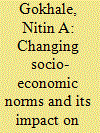

|
|
|
|
|
| Publication |
2013.
|
| Summary/Abstract |
The Indian Army remains rooted in an outdated, British-inherited system that is struggling to cope with the combination of challenges posed by demands of modern warfare and a society that is undergoing a great churn. The greatest challenge has been to the famous officer-men relationship in the Indian armed forces. In the past decade, the armed forces have faced a new problem: increasing incidents of indiscipline, suicides and fratricide. Are these incidents happening because the traditional bond between officers and men, the bedrock on which the military functions, is fraying at the edges? Are there other external factors impinging upon the armed forces' functioning and eroding some of its admirable values? The article attempts to focus on these issues and provide some basic answers.
|
|
|
|
|
|
|
|
|
|
|
|
|
|
|
|
| 2 |
ID:
118328
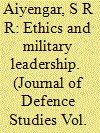

|
|
|
|
|
| Publication |
2013.
|
| Summary/Abstract |
Ethics' derived from the Greek word 'Ethicos', means character or manners and guide actions thereby becoming a 'normative discipline'. Military Ethics applies to a specialized realm and has developed principles appropriate to it over time to help guide future operations. The armed forces must be always ethically led to uphold the defence of the nation and its national interests. Ethical leadership embodying the ideals of the profession of arms entails creating ethical command climates that set the conditions for positive outcomes and ethical behaviour. This article identifies commonly observed fault lines in the ethical conduct of a few members in the armed forces. Without being over-critical of ethical lapses in recent times, it suggests certain steps that could be emphasized to enhance the prevalent ethical climate.
|
|
|
|
|
|
|
|
|
|
|
|
|
|
|
|
| 3 |
ID:
118330
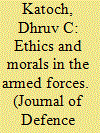

|
|
|
|
|
| Publication |
2013.
|
| Summary/Abstract |
Value systems form the spine of modern society, religion and every individual's conscience with moral codes defining 'appropriate' and 'expected' activity. Ethics refer to an individual's actions that are consistent with such value systems. While the former constitutes a basic human marker of right behaviour and conduct, the latter are a set of guidelines that define acceptable behaviour and practices for a certain group of individuals or society. Within this construct, this article traces the origin and growth of Indian and Western ideas on the subject and probes similarities between the two. The article thereafter dwells on the perceived decline in moral values in India-a widespread belief-even though no empirical study exists to substantiate this claim. The author then suggests that the focus needs to shift from a perceived 'ethics crisis' to how ethical leadership can be strengthened within the armed forces.
|
|
|
|
|
|
|
|
|
|
|
|
|
|
|
|
| 4 |
ID:
118322
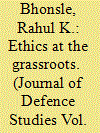

|
|
|
|
|
| Publication |
2013.
|
| Summary/Abstract |
This article addresses the declining standards of morality in the armed forces and suggests measures to address it by undertaking appropriate interventions at the grassroots, unit or battalion. It traces the importance of ethics in the military, particularly in the context of the post-modern state, which grants exclusive authority to the armed forces for the use of violence. Further, it examines the state of ethics today and the challenges in codification to arrive at the basic ethical norms that need to be fostered in the military. Having established this, the article goes on to highlight the context of ethics at the unit level, outlining the challenges faced, including in counter-insurgency operations, normal administrative functioning, and the current approach to ethics training. The author proposes three options as suggestions for building an ethical culture in the unit-the Kohlberg model, the Values and Virtues Approach, and a Code of Conduct.
|
|
|
|
|
|
|
|
|
|
|
|
|
|
|
|
| 5 |
ID:
118321
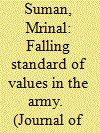

|
|
|
|
|
| Publication |
2013.
|
| Summary/Abstract |
As human beings are a product of their environment and society, their interpretation of morals, ethics and value system differ. In a traditional culture like ours, attitudes are moulded by long-established practices, rituals and conventions. Group cohesion is a battle winning factor for a military. The Indian Army recruits officers and men from all parts of the country with diverse value systems and attitudes. It is well nigh impossible to weave them into a cohesive group without bringing them on to a common grid of conduct. Instead of attempting to supplant their concepts of morality, ethics and righteousness, it is considered wiser to steer their conduct through a set of organizational norms. Norms are well-evolved and time-tested rules that act as rational and judicious guiding principles. They must be followed diligently for the continued good health of a military.
|
|
|
|
|
|
|
|
|
|
|
|
|
|
|
|
| 6 |
ID:
118324


|
|
|
|
|
| Publication |
2013.
|
| Summary/Abstract |
The phenomenon of the apparent lowering of both personal and institutional moral and ethical standards in the armed forces is not limited to India. What is missing is an open debate on the complexities that drive the modern day profession of arms and the need for a mutually supporting relationship between the armed forces and the institutions of a democracy, especially at a time when newer forms of security threats are emerging. In this changing order, the society, Parliament, the government, media, and the armed forces need to look within with a view to restoring a healthy balance in this relationship in order to regain the moral and ethical high ground on which this relationship rests. The setting up of a Blue Ribbon Commission would serve the purpose of proposing a blueprint for further debate and adoption.
|
|
|
|
|
|
|
|
|
|
|
|
|
|
|
|
| 7 |
ID:
118329


|
|
|
|
|
| Publication |
2013.
|
| Summary/Abstract |
There has been a palpable decline in the standards of morals, ethics and values as observed by officers in the armed forces and the bond between officers and men has weakened. This could be because officers with the requisite qualities are not adequately groomed to rise to the level of battalion commanders. The present appraisal system is largely to blame, it being based on a single Annual Confidential Report. A further drawback is that only superior officers report on a ratee. Inputs for appraisal need to be drawn from multiple sources geared towards a '360 degree evaluation'. The appraisal system should enforce accountability in officers, facilitate their continuous improvement, reward competence and sincerity, recognize efficiency, and confirm an officer's suitability for the post. It should encourage both an officer's career development as well as self-development linked to organizational goals. The system must thus evaluate both mission accomplishment and organizational development.
|
|
|
|
|
|
|
|
|
|
|
|
|
|
|
|
| 8 |
ID:
118327
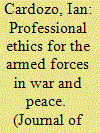

|
|
|
|
|
| Publication |
2013.
|
| Summary/Abstract |
This article looks at the current situation in the armed forces, which has been in the news for all wrong reasons recently. The author undertakes an analysis of the causes of this state of affairs and suggests that the armed forces, which were well known for their ethics and code of conduct, need to review the situation and take radical steps to ensure a return to their ethics, values and traditions.
|
|
|
|
|
|
|
|
|
|
|
|
|
|
|
|
| 9 |
ID:
118326
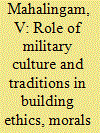

|
|
|
|
|
| Publication |
2013.
|
| Summary/Abstract |
Developing culture and traditions is one of the pragmatic ways of breeding ethics and moral standards in the military. These moral issues are profoundly linked to the military's way of life and ethos, which includes discipline and esprit de corps. Although issues like developing a sense of belonging may be the theme while creating cultures, the ultimate aim is to influence a soldier into becoming an ethical team player as an instrument for winning wars. The creation and pursuit of culture establishes common values and a sense of ownership amongst the troops. The military family thus created prevents individuals from doing the unethical. The pride in a soldier forces him to protect the honor of his military family, if need be by making the supreme sacrifice. This article elucidates military culture and traditions besides explaining their relevance to ethics.
|
|
|
|
|
|
|
|
|
|
|
|
|
|
|
|
| 10 |
ID:
118323
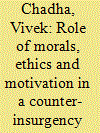

|
|
|
|
|
| Publication |
2013.
|
| Summary/Abstract |
Morals, ethics and motivation are the bedrock of the Indian Army, since it is considered more than a profession: a way of life. These qualities are put to test under most conditions of soldiering; however, there cannot be a more difficult environment than involvement of an army in protracted counter-insurgency (CI) operations. The conditions faced pose peculiar challenges, which force a soldier to adapt. This adaptation can potentially become a morally corrupting influence unless the ethical standards of a force and its moral bearings continue to guide actions. This is also an important determinant for leading a motivated army in such operations. This article assesses the circumstances and peculiarities of CI operations, the linkage between morals, ethics and motivation, impact of poor implementation of these values, and the measures to sustain a high-value system. Finally, it analyses the impact of these factors on the realities of CI operations.
|
|
|
|
|
|
|
|
|
|
|
|
|
|
|
|
| 11 |
ID:
118320
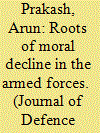

|
|
|
|
|
| Publication |
2013.
|
| Summary/Abstract |
The precipitate decline in moral and ethical values, as well as the steep fall in standards of private and public conduct, in recent years, has been accompanied by a concurrent erosion of values amongst India's military personnel. Consequently, the armed forces, which were once considered exemplars of ethical conduct, discipline and decency, are rapidly slipping in the estimation of their countrymen. The author points out that this moral decline could lead to a loss of cohesion and combat-effectiveness in the armed forces with deleterious implications, not just for national security but also for India's social fabric, of which the 3-4 million soldiers and veterans form an integral constituent. Redemption of the military's honour and restoration to its earlier iconic status is, therefore, considered a national imperative. The author has highlighted specific ethical challenges that could confront officers during their careers and offers practical advice to the armed forces' leadership to tackle these challenges.
|
|
|
|
|
|
|
|
|
|
|
|
|
|
|
|
| 12 |
ID:
118331


|
|
|
|
|
| Publication |
2013.
|
| Summary/Abstract |
The erosion in moral values in the armed forces over the past few decades has left India's political and military leadership bewildered and befuddled. No amount of preventive or curative measures appear to be succeeding in arresting this fall, as day after day dawns with news of fresh instances of impropriety and indecorum. This article attempts to examine the issues of morals and ethics as relevant to the profession of soldiering across the time continuum. It dwells further on the probable causes of the erosion of moral values and ethics in the Army. The article suggests certain fundamental approaches towards addressing this complex human issue albeit with immense prudence, as 'sometimes the remedy is more lethal than the disease'.
|
|
|
|
|
|
|
|
|
|
|
|
|
|
|
|
|
|
|
|
|